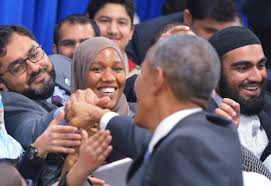
(Credit: Washingtonpost.com)
The same day President Obama visited a U.S. mosque for the first time as president, the Pew Research Center showed why many Americans likely objected to his even setting foot there.
That sentiment was pretty well expressed by GOP presidential candidate Sen. Marco Rubio (R-Fla.), who cast Obama’s suggestion that the United States discriminates against Muslims as Obama pitting Americans “against each other.”
Others criticized Obama for the specific mosque he chose and its ties. And late Wednesday night, Donald Trump said perhaps Obama “feels comfortable there” — a comment thick with innuendo from a man who championed conspiracy theories about Obama’s birthplace.
“We have a lot of problems in this country, Greta,” Trump said on Greta Van Susteren’s Fox News show. “There are a lot of places he can go, and he chose a mosque.”
Jeb Bush, on the other hand, argued it was a positive step. And as we’ve discussed before, his brother George W. Bush would likely agree. The elder Bush, after all, visited a mosque shortly after the Sept. 11, 2001, terrorist attacks with a message pretty similar to Obama’s.
The Post reported at the time:
In a gesture that surprised and gratified Islamic leaders, Bush stepped up an already intense effort by his administration to prevent hate crimes and discrimination against nearly 10 million American Arabs and Muslims in retaliation for the World Trade Center and Pentagon attacks by Middle Eastern terrorists.
“The face of terror is not the true faith of Islam,” said the president, escorted by Islamic clerics into the ornate mosque full of Turkish tile, Persian rugs and Egyptian paintings. “Islam is peace.”
So why is something a Republican president did in 2001 suddenly divisive when a Democratic president does it 15 years later?
Rubio is free to enunciate why that is — and it could definitely have something to do with Obama singling out Republicans in the speech and his refusal to say the words “radical Islam” (though Rubio didn’t mention those things in his comments) — but more broadly, Islam is simply something that gives an increasing number of Republicans heartburn.
The Pew poll in 2002 showed 47 percent of Republicans and independents who leaned Republican said either “most” or “half/some” Muslims are “anti-American.”
Today, that number is now 63 percent.
Just 3 in 10 Republicans say the number of anti-American Muslims is only “just a few” or “none.” Think about that for a moment, and it’s not hard to see why many Republicans rallied to Donald Trump’s proposed ban on Muslim immigrants.
Pew has a raft of other data showing GOP voters are significantly more suspicious of how violent a religion Islam is and are much more likely to say that politicians shouldn’t be afraid of saying things that might be seen as critical of Islam.
But the chart above shows, better than just about anything else, how much more polarized we are on this issue. Call it the Trump Effect. Call it a symptom of how Americans now consume their news and information. Call it a reaction to the rise of the Islamic State.
Whatever it is, it is much more pitched than it was even after the 9/11 terrorist attacks. Bush’s move at the time was seen as somewhat bold; in today’s Republican Party — and without the huge popularity Bush enjoyed in the days after 9/11 — it’s not a stretch to argue that it never would have happened.

